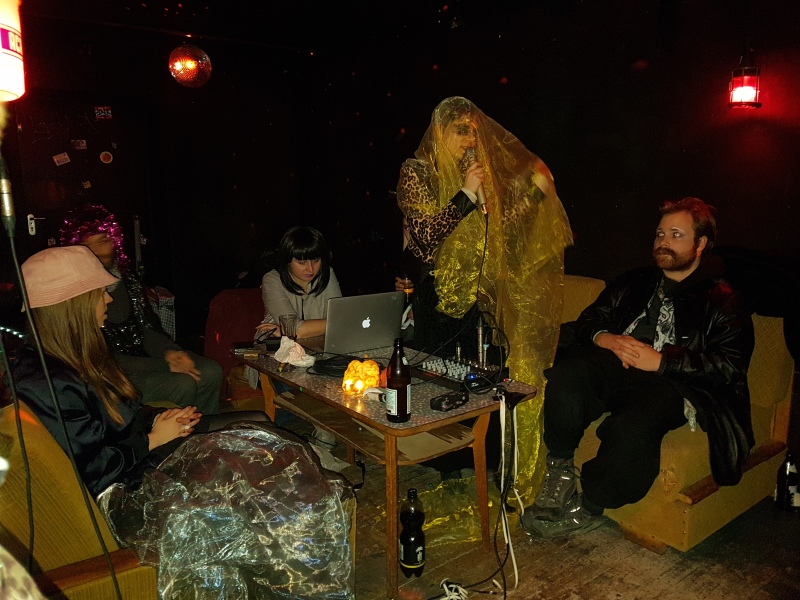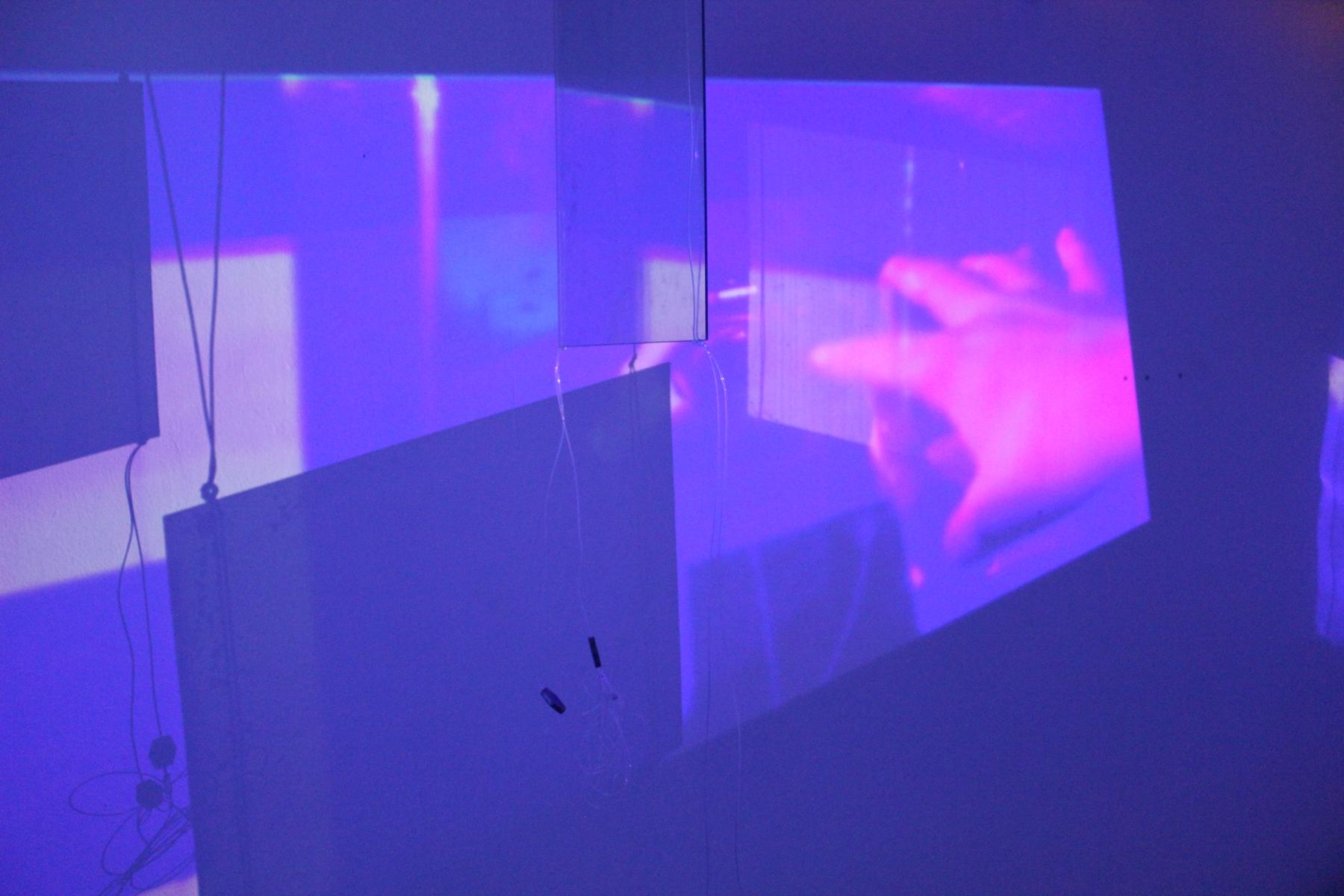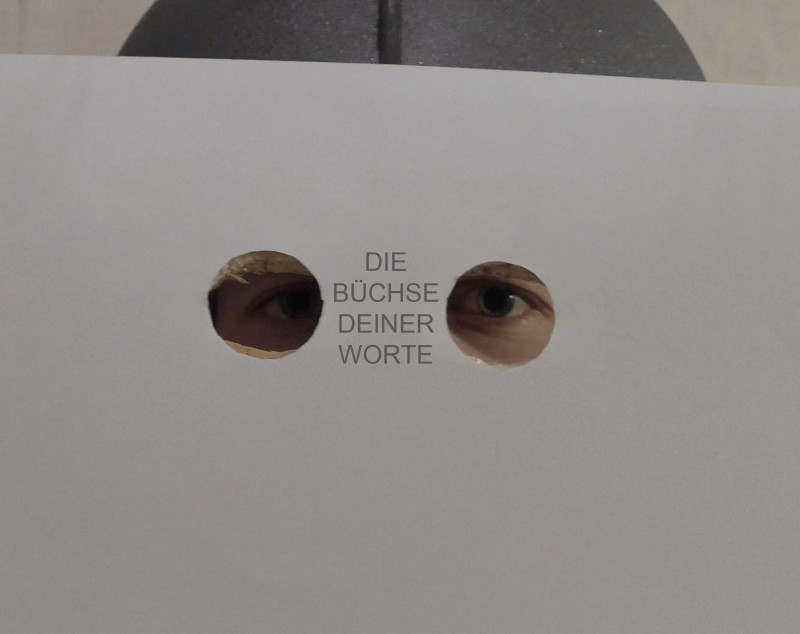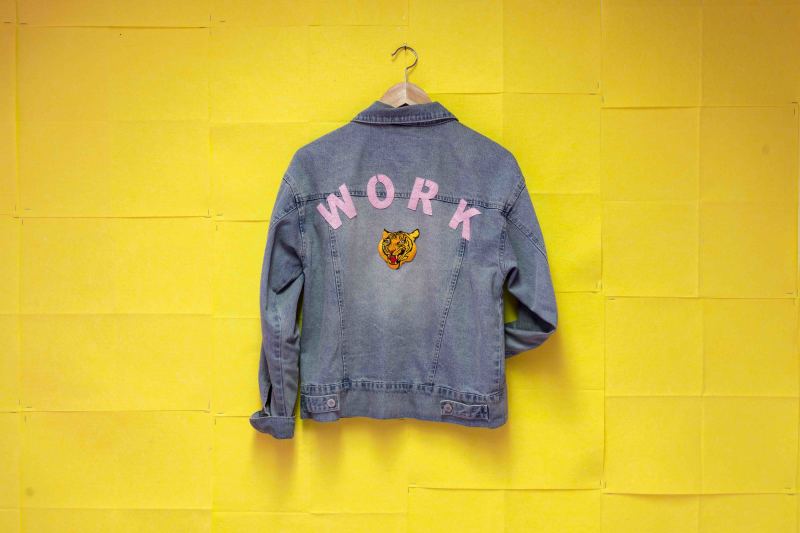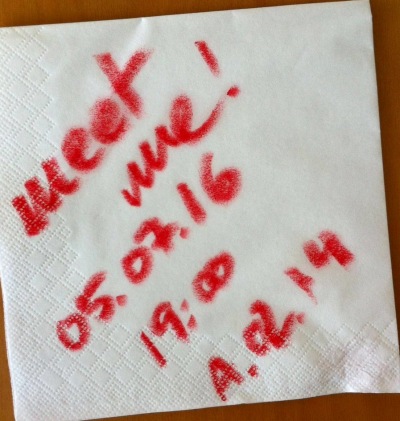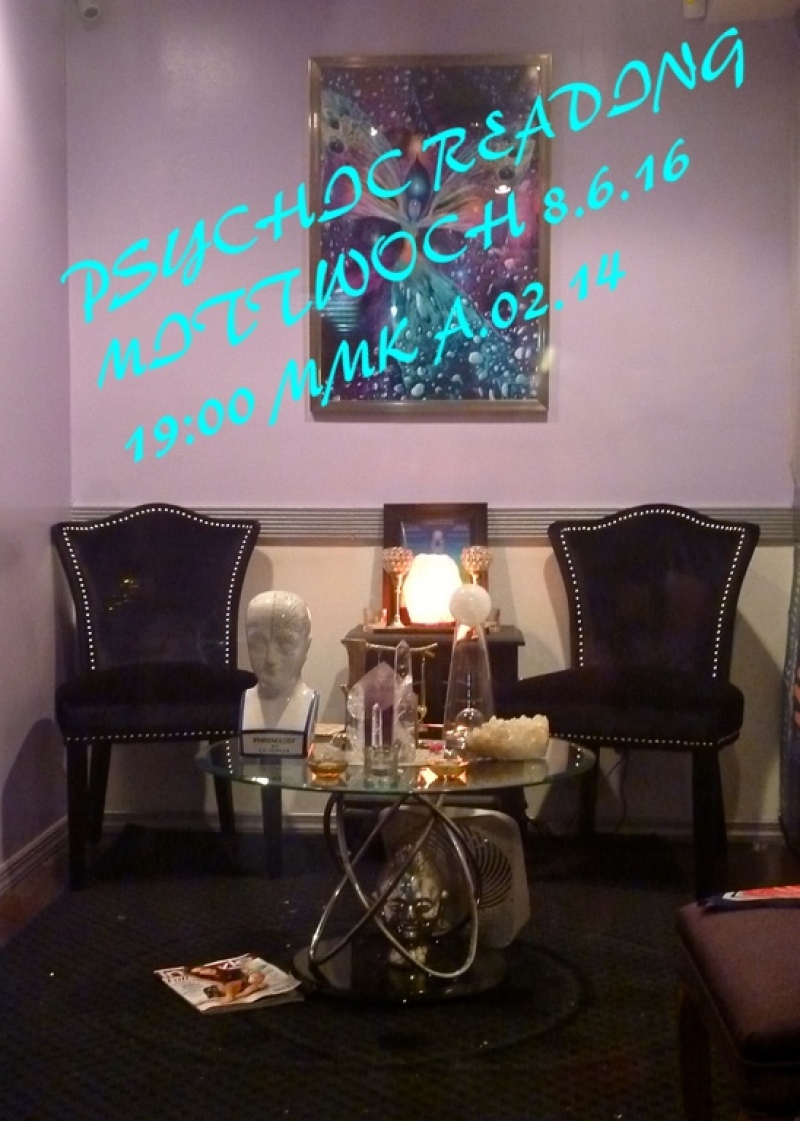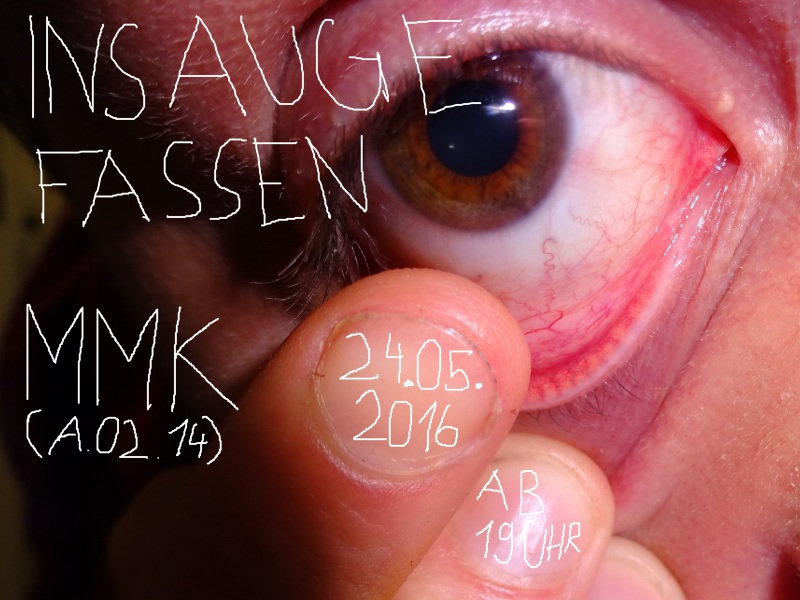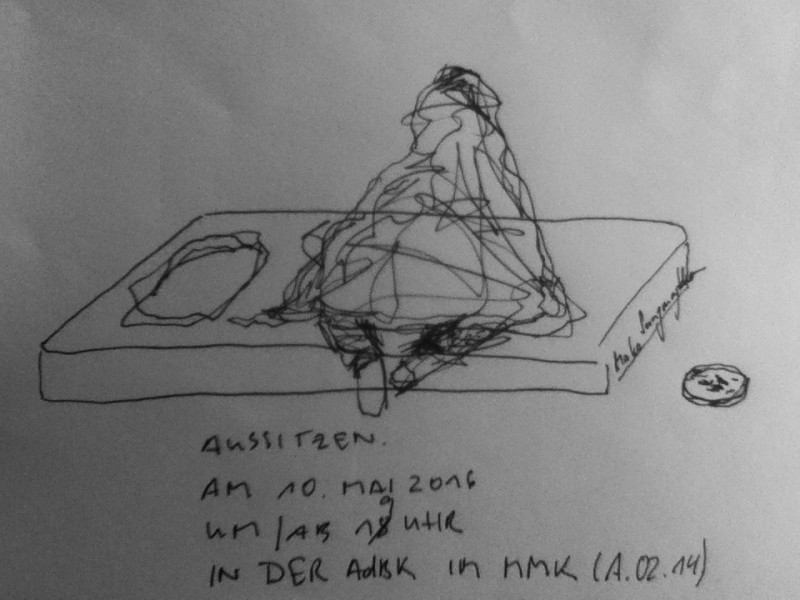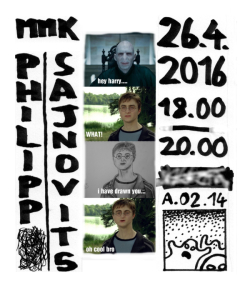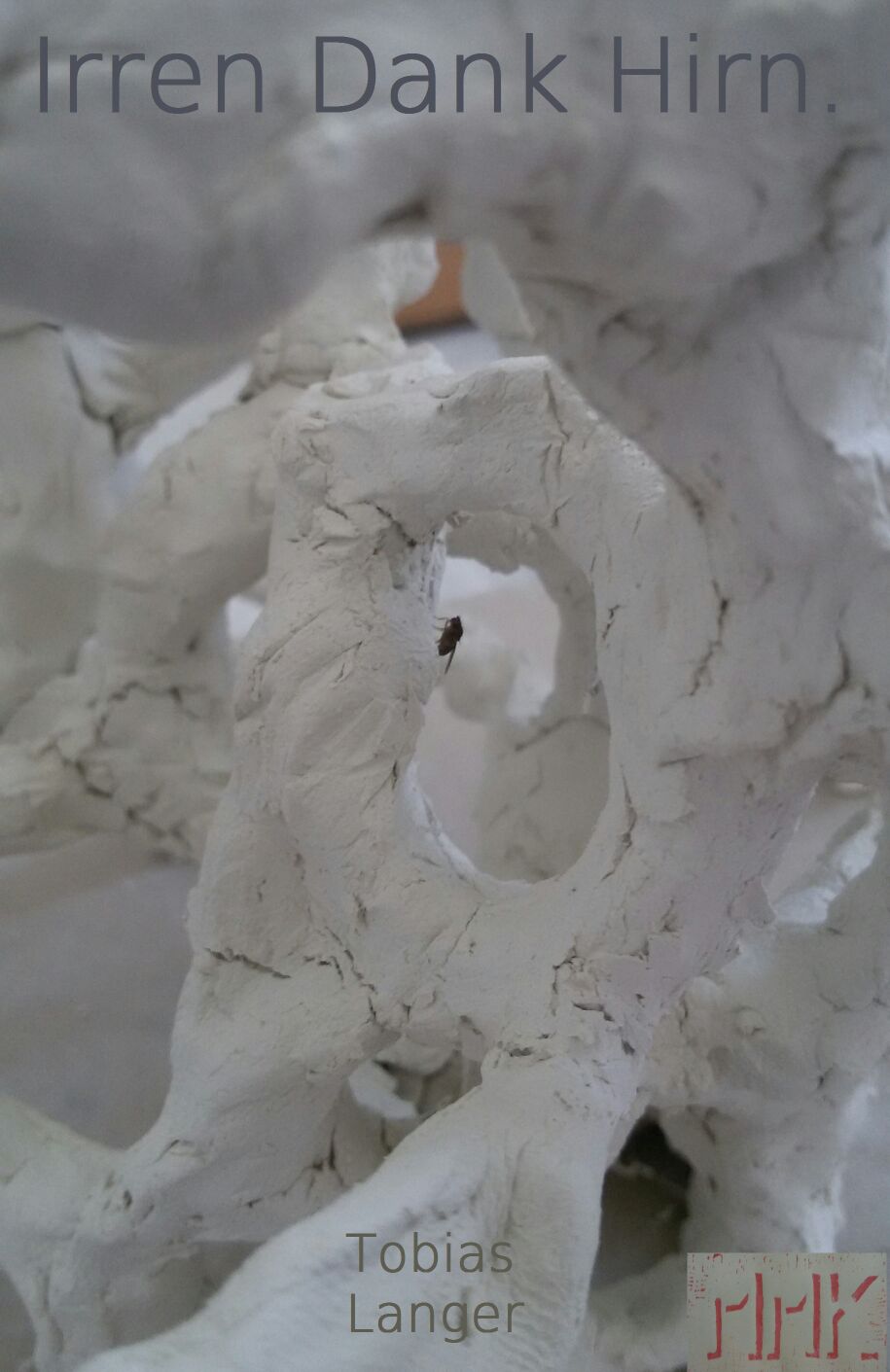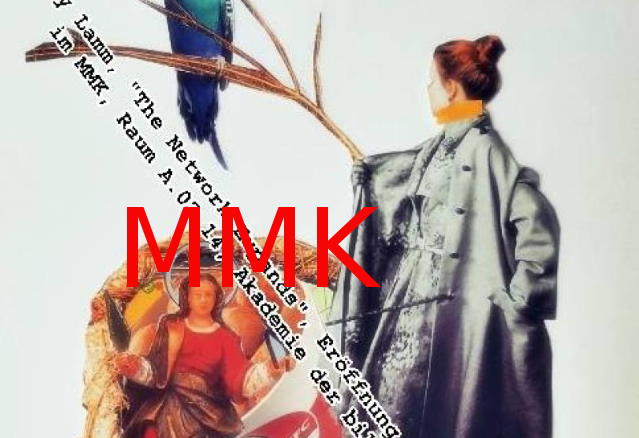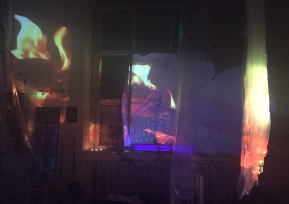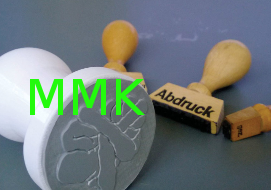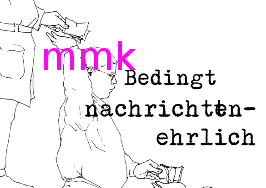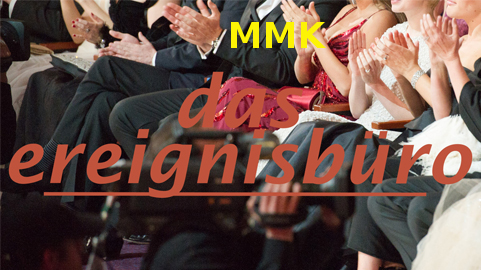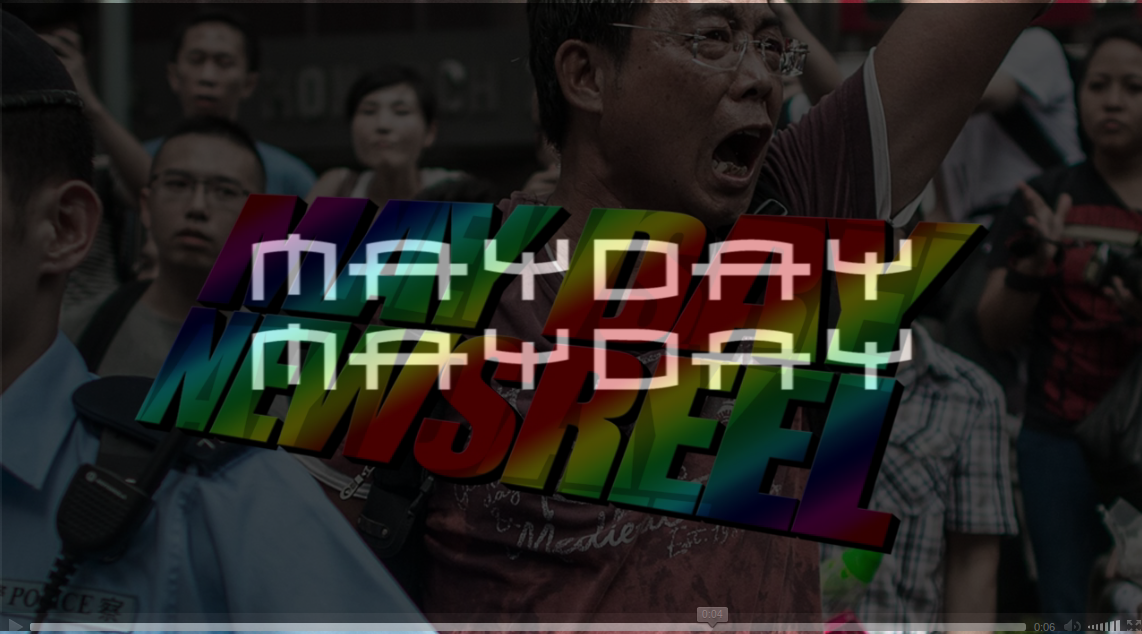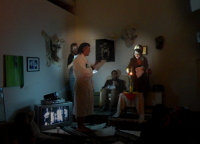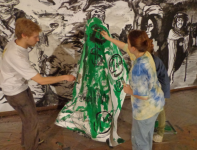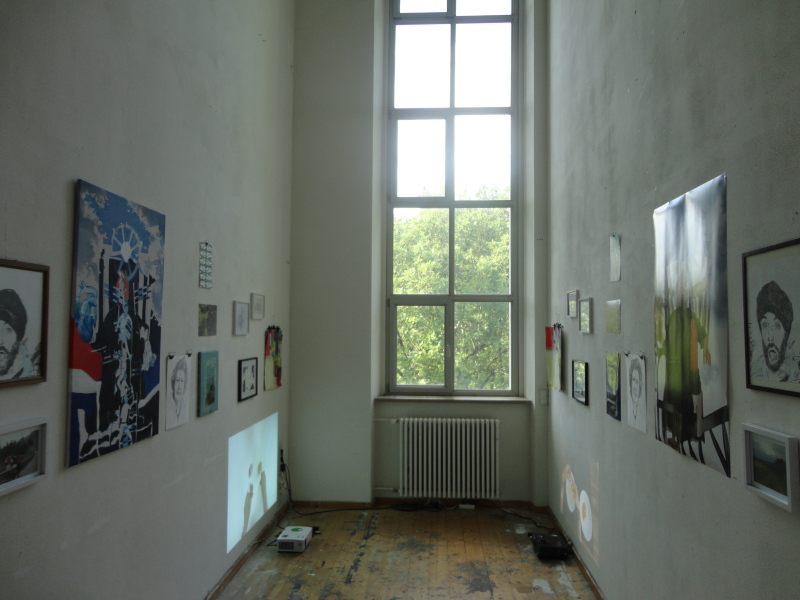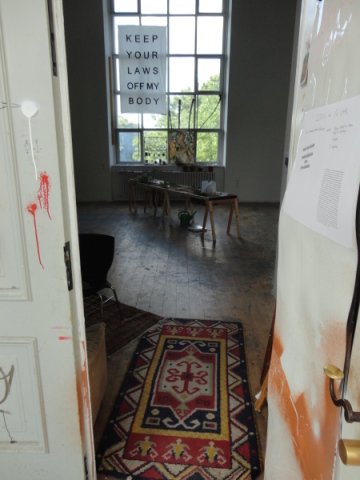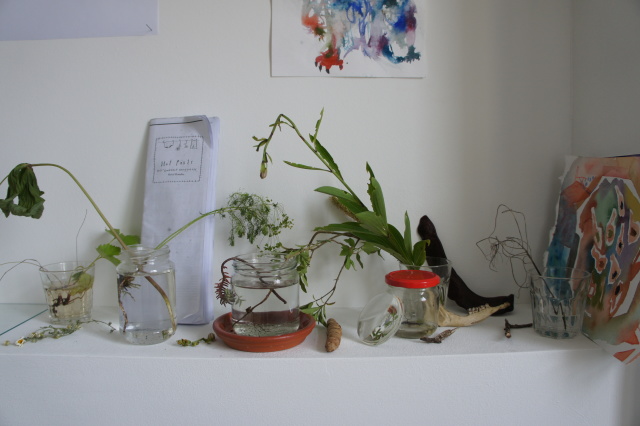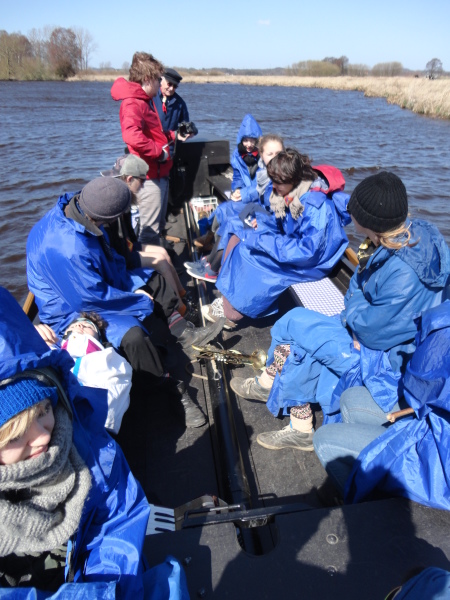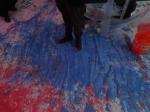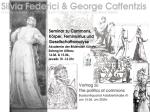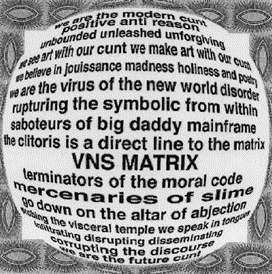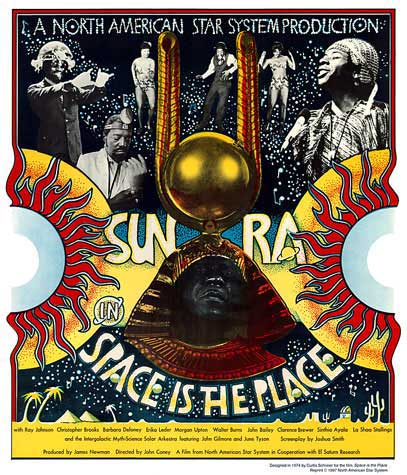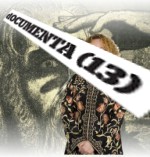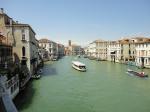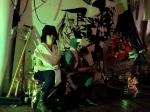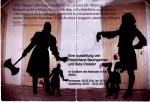Νέα από την Ελλάδα - Nachrichten aus Griechenland 2013
- Die Reise - wer fährt mit, was kostet es?
- Zeitplan
- Euro Krise - Geld Ökonomie Theorie
Dimitris Exarchos: if you ever want to check the Greek news, my favourite news website now has an English version, which I thought you might find interesting: http://www.thepressproject.net/
Demetra Kotouza von Mute hat gemeinsam mit ihrem griechischen Blaumachen Kollektiv z.b. einen guten text zur selbstorginsation und ihre limits geschrieben - ursprünglich für das symposium am nbk, das unsre ausstellung begleitet hat - wo auch Nikos eine presentation über die konkrete situation "on the ground" gab - ausserdem gibt es viele gute kurzreportagen zu industrial actions, factory übernahmen etc. (allerdings oft nur in griechisch) z.b. von dem athener filmemacher kollektiv diakoptes in dem auch ein sehr guter freund von nikos involviert ist.
http://www.metamute.org/editorial/articles/limit-self-organisation-greece
http://www.youtube.com/user/DiakoptesAthens
betreffs anarchie viertel ....
"anarchistisches viertel" wo leute illegal den strom anzapfen?... Aaahhh!!! Super - Zwischen Mythos und Realität ! So kreiert Mann Legend!! Wir besuchen alles... Vassilis Noulas Performance Stück zB findet statt in Exarchia das wahrscheinlich so genannte anarchistisches viertel....
...und ja - ich wohne auch im anarchistischen viertel... - wäre eigentlich ganz schön wenn die adbk studenten uns erstmal erzählen was sie so an realitäts-mythen gehört haben und dann können wir uns zusammen anschaun wie das tatsächlich aussieht, und vielleicht noch freunde dazu einladen (ich kenne zb einen artzt der sehr politisch aktiv ist, krankenhäuser besichtigen macht nicht soviel sinn denn oberflächlich sieht man nichts - aber er könnte zum beispiel genaueres über diese situation berichten). ein langer spaziergang durch die stadt gibt auch ein sehr gutes erstes bild. das könnten wir uns für dienstag 5/11 nachmitag vor dem bienale besuch vornehmen.
ausserdem können wir euch zu spezifischen themen auch links schicken.
folgendes aus dem neuen modifizierten antrag: wir gingen bei unserem antrag "survival kit" sehr stark von der idee der selbstorganisation aus und wie sehr diese im rahmen unserer akademien fruchtbar gemacht werden kann. während dies in münchen eher künstlerische strategie ist, ist die fähigkeit zu selbstorgaanisation in Athen schon überlebensnotwendig.
insofern wollen wir auch künstler zu unserem projekt einladen die in ihrer praxis selbstorganisiert sind, bzw dies thematisieren. so ist zb vassilis noullas massgeblich an der theaterbesetzung von 'Embros' in athen beteiligt, dort wird seither sehr engagiert selbst theater organisiert. in seiner eingenen wohnung führt er zudem regelmässig experimentelle stücke für ein kleines publikum auf, oder bespielt gemeinsam mit dem von ihm mitberündeten Nova Melancholia Kollektiv öffentliche Plätze im Herzen der Stadt.
die künstlerin dora economou hat mit der diy publication 'kypseli' eine monatliche platform für die veröffentlichung von texten und bildstrecken lokaler künstler geschaffen und setzt selbstbewusst die tradition der athen untergrund kunst- und kulturszene fort. als bildhauerin schafft sie objekte aus gefundenen materialien, die den zeitgeist der stadt wiederspiegeln und kollaboriert mit vassilis noullas und kostas tsioukas an performances und experimentellen bühnenbildern und kostümen.
der choregraph kostas tsioukas, der 2006 seine eigene tanzgruppe gründete, ist eine der wichtigsten jungen choreographen in der experimentellen tanzszene athens und verbindet in seinen arbeiten traditionellen tanz, popkultur und kunst. interdisciplinäre kollaboration ist auch für ihn ein wichtiger bestandteil seiner praxis, so arbeitete er auch zb auch mit videokünstlern wie anthea hamilton und anja kirschner zusammen.
wir verstehen somit auch unser programm, und die mittelvergabe des daad in einer weise, dass wir zum bestehenden hochschulprogramm etwas beitragen was sich die hochschule nicht leisten kann. so versteht sich eben die teilnahme vornehmlich griechischer tanz- und performance künstler an dem arbeitsaufenthalt in delphi, damit eine recherche über tradition von orakel, tanz und drama vor ort betrieben werden kann, kostas tzioukas würde zu diesem zweck eigens aus belgien anreisen, wo er derzeit ein stipendium verbringt. diese beiträge würden selbstvertändlich honoriert werden muessen, weil diese künstler zwar dem umfeld der ASFA zugerechnet werden, dort eher aber auf der wunschliste stehen.
---
es reisen (4-12nov) 15 studierende von münchen nach athen, in begleitung von sd. wir treffen dort auf projekt koordinator (arvanitis) und projektbegleiterin (kirschner) reisen zusammen mit 15 studierenden und 3 künstlern zum intensiv-workshop nach delphi. gestalten danach in athen selbst einen performance abend
DORA ECONOMOU (artist/sculpture)
KOSTAS TZIOUKAS (dancer, choreographer)
VASSILIS NOULAS (theatre director)
es reisen (2.-10 dez) 15 studierende von athen nach münchen, in begleitung von prof zafos xagoraris und von projekt koordinator (arvanitis) und projektbegleiterin (kirschner). sie treffen dort auf 15 studierende aus münchen und sd und werden innerhalb einer knappen woche eine ausstellung im laden lothringer 13 ralisieren / wegen knapper terminplanung ist der ausstellungsort noch nicht endgültig fixiert. sie treffen ebenfalls für 2 tage auf den künstler johannes paul raether, der sich in seinen eigenen arbeiten umfangreich mit der idee des orakel ausseinandergesetzt hat und entwickeln mit ihm eine performative installationsarbeit zur eröffnung der ausstellung.
- wie gesagt, delphi solte mindestens 3 tage sein, besser vielleicht auch 4, denn da wird die konzentrierteste zusammenarbeit und austauch kennenlernen etc möglich sein. nikos sagt nachdem übernachtung für die münchner studenten in delphi eh umsonst ist, könntet ihr somit kohle sparen und noch ein paar extra tage danach in athen dranhängen.
- dora und vasillis haben am 4&5 eine andere aufführung also wären die studenten eh erstmal 4 tage in athen. dann können wir für 3-4 tage gemeinsam nach delphi fahren und dort alles was wir in athen zusammengetragen, erlebt, recherchiert haben dort gemeinsam in unser orakel transformieren.
- kostas tsoukas kann leider terminlich nicht nach delphi mitkommen. allerdings haben wir heute früh nochmal mit dora und dann auch vassilis nullas gesprochen und der kann für ihn einspringen, was eine super lösung ist, den vassilis nullas war eh einer von den leuten die wir in das längere austausch projekt involvieren wollten.
- in griechenland wollen wir mit dora economou und kostas tsoukas zusammenarbeiten - die idee ist hier das delphische orakel zu reaktivieren und ihm eine prophecy angesichts der future/no future situation zu entlocken. dabei gehen wir an die idee das orakles via künstlerische forschung von verschiedenen perspektiven heran - also historisch, als affekt/denk figur (wo dann z.b. auch meine eigene horror/supernatural/possession recherche mitreinspielt), körperlich (kostas: tanz, ekstase, popkultur, mary wiggman, isabella adjani in posession), punk poetisch/aesthetisch (dora: found material sculptures, textcollages) etc. - was genau das für ein orakel wird werden wir gemeinsam bestimmen und herausfinden, sicherlich spielt auch die idee des falschen, manipulierbaren orakels mit hinein und auch die der 'self-fulfilling prophecy' in form von financial analysys/rating acgencies/ECB wich is condemming us to technocratic/neoliberal debt slavery and destroying the imagination for any alternatives.
- da die zeit ohnehin knapp ist weil alles noch in diesem jahr geschehen muss gehen wir an das ganze sehr intuitiv und improvisatorisch heran - das hauptziel ist eigentlich praktisch zusammenzuarbeiten und der imagination dabei freien lauf zu lassen und überhaupt das ganze weniger als lehrprojekt als gemeinsamen hellsichtigen trip nachzugehen, der in athen in einer art work-in-progress performance und in münchen in einer DIY kurzausstellung realisiert werden soll.
- johannes is not coming to athens now, hopfully to munich - we would like to include Zafos Xagoraris, who is a professor at ASFA and also a really interesting artist and friend of Nikos to come to Munich with us and be part of this as our official ASFA representative and contact.
- because of the delay to the start of the semester due to strikes and the tight timeframe is to get professor to put forward 3 MFA students per department that have a suitable practice. That means we may end up with slightly less than 15 students, so again the money could be alocated elsewhere - as it was quite a tight budget anyhow.
- We also need to be clear on how money is distributed to the students for travel and accomodation: the Munich students will basically get EURO 225 towards the travel to athens. anything above they'll have to cover themselves. They also have a daily allowance of EURO 55 each for 7 days - this will have to cover accomodation in athens (including food etc.) but in Delphi accomodation is free, so here we were thinking of having a shared pot so we can cook together (as the ASFA students don't get an allowance for Greece).
- If the Munich group wants to stay more days in athens and less days in Delphi that's fine, but I think going to delphi for 3 days (arriving on the morning of the first day, staying two nights, leaving in the late afternoon of the 3rd day) would be a minimum and good to get some time together. Dora and Kostas are both up for it and excited about it, so we will ask them to come with us for the whole 3 days and we can rent a bus to travel together.
- we should set the Munich dates so Nikos and I can do a block ticket reservation with aegean airlines asap. Johannes says he's up for coming but travelling to theran on 7 dec, so maybe we should think about doing this in the first week of dec?
DISCUSSIONS
700 Euro mehr (monatlich ; lebenslänglich) von der Sozialkasse für HI-Virus-infizierte: absichtlich mit AIDS anstecken
Schuldenkrise in Griechenland - An den Menschen vorbei Von den 207 Milliarden Euro an Hilfskrediten, die die Euro-Partner und der Internationale Währungsfonds (IWF) bisher nach Athen überwiesen haben, kamen fast 160 Milliarden nicht den griechischen Bürgern zugute, sondern den Banken und Kapitalanlegern im In- und Ausland.
Mehr als 20 Prozent billige Arbeitskräfte Nur in sechs europäischen Ländern ist der Anteil schlecht bezahlter Arbeitnehmer höher als in Deutschland
Flugschrift "Griechenland: was tun?" von Karl Heinz Roth - 22.12.12
IN MY OWN DEFENSE by Victor Shklovsky
I'm not trying to tease anyone when I write about Tolstoy. History is perfect. Any phenomenon is more understandable when we can understand the process of its origin. All around us are many matters demanding rapid decisions, but in order to decide it's necessary to know what i have to say about worker-peasant art to an individual who knows nothing, not only about the laws of art, but about the material itself and the works or art themselves.
I'm not a literary con-man and i'm not a magician. All I can give to the leaders of the masses are those formulas which will help make sense of newly appearing phenomena - after all, the new develops according to old laws. It's painful to me to read the rebukes of Pravda and it's offensive to be referred to as "Mister." I'm not a "Mister." I've been Comrade Shklovsky for five years now. My comrades who, along with me, write for newspapers deserve respect and not rebukes. We are not hacks. We work from primary sources and we take our work seriously. The fact that we write articles on Schiller and Sterne, solving problems anew, is a miracle. Comrade from Pravda, this is not an apology. This is an assertion of my right to be proud.
We are too precuppied by knowledge and we get too carried away by the popularisation of science. We think too little about productivity in science; we haven't made a place for it.
My comrades and I work by the light of oil amps when the temperature is 32 degrees Farenheit. we will work by torchlight and we will work when the temperature is below zero, but only as we can. we know were we are going.
+++++++++++
Just a couple of thoughts inspired by this text and recent conversations/situations. These are really broad questions that don't mean anything if phrased in general but could be really good questions if focused on the particular form and context our project will take:
In the context of 'survival kit' but also from our point of view as a group of artists working together let's think more about productivity in art. About our means of production, but also what we produce, to what purpose and for whom. Are we too preoccupied by the production of knowledge in art (in the sense of a neo-liberal knowlege economy and it's increasing valorisation etc.)?
Say our practices predominantely take the form of collaborative, performative and event and knowledge-based outputs, incl. public seminars, screenings, interventions, free parties, (temporary) repurposing of spaces - do we want to produce these as indentifyable authors (whether individual or collective)? Should or shouldn't they be documented and if so in what form? What about the idea of ceasing to produce? What else could be produced? How do we secure our means of production/distribution/communication? Are durable products and idenifyable networks preferable to temporal, ephemeral, anonymous ones responding to changing situations/audiences/legal and economic sanctions?
And last but not least - how do we identify ourselves (as artists, as members of different classes etc.) but also in the DAAD framework of this project in which we are framed as northern and southern europeans concerned with our 'common future'?
[AK]
RELEVANT EXHIBITIONS AND EVENTS ELSEWHERE (ONGOING)
ALL TALKS IN THIS SERIES ARE AVAILABLE FROM THE ARTISTS SPACE WEBSITE AS EMBEDDED VIDEOS: http://artistsspace.org/programs/on-the-necessity-of-arts-exit-from-contemporary-art/
Suhail Malik: ON THE NECESSITY OF ART'S EXIT FROM CONTEMPORARY ART
Artists Space presents a series of four talks and discussions led by Suhail Malik, writer and Co-Director of the MFA Fine Art at Goldsmiths, London, based on his research and writing on the conditions and shortcomings of contemporary art. Beginning on Friday May 3 and extending over a six-week period, the format provides scope for sustained dialogue and responses to Malik’s propositions. Each session will involve the participation of guest artists and writers as respondents.
Contemporary art’s shortcomings are increasingly evident even with respect to its own purported ambitions: proposing alternatives to homogenizing, normative conventions; as a method or mechanism of escape from the standardizations and conventions set by large-scale, commercial-corporate, or institutionally secured forms of recognition; as a site of utopian proposals, and so on. These imperatives impose themselves yet more severely when contemporary art itself establishes such norms and institutional figures. The effort is then made to escape art as we have it, perhaps for a more valid, more immediate, perhaps more populist or accessible kind of art which, for that reason, would have yet greater critical-political traction than institutionalized art. The now-familiar emphases on public participation, nonart, smuggling, deterritorialisation, inbetweenness, eventhood, indeterminacy, deskilling, etc. all heed this imperative. But as re-iterations of the logic of escape, these efforts also perpetuate and entrench the very limitations of art they seek to overcome. The resulting interminable endgame of art’s critical maneuvers serves after a short moment to provide new paradigmatic exemplars for it, a condition of tamed instability that characterizes contemporary art today well enough.
This series proposes that for art to have substantial and credible traction on anything beyond or larger than itself, it is necessary to exit contemporary art. An exit that requires the revocation of contemporary art’s logic of escape. If the demand here has an appeal and deserves attention—and it need not since the current constitution of contemporary art serves very well the aesthetic, intellectual, and sociological forms that sustain prevalent power in and through the art field, including all prevalent forms of critique—then this demand must be placed not just on the art itself but also on the ideas it invokes, as well as the social structures and ethos sustaining this configuration. The question then is what this art other to contemporary art’s paradigm of escape can be? What other kind of social structure and distribution of power than that prevalent in contemporary art would support it? What should an art that is not contemporary art do? Of what would its traction consist and amount to?
Friday, May 3, 7:30pm 1. Exit not escape In which the necessity for art’s exit from contemporary art is derived.
Friday, May 17, 7pm 2. The problem with contemporary art is not the contemporary In which contemporary art’s attribution of its limitations to the contemporary is disputed.
Friday, May 31, 7pm 3. A history of negations In which the exit from contemporary art is shown to not be art’s negation.
Friday, June 14, 7pm 4. Institution In which art's avowal of its institutionality is shown to grant art the traction contemporary art seeks but must deprive itself of.
Suhail Malik writes on political economy, theory, and the axioms of contemporary art. Malik holds a Readership in Critical Studies at Goldsmiths, London, where he is Programme Co-Director of the MFA Fine Art. For 2012-13, Malik is Visiting Fellow at the Center for Curatorial Studies at Bard College, New York.
Recent publications include: "The Politics of Neutrality: Towards a Global Civility" in The Human Snapshot (2013), “Tainted Love: Art’s Ethos and Capitalization” (with Andrea Phillips) in Art and Its Commercial Markets (2012), “Just When You Thought It Was Safe to Participate Again—Communism, Its Recurring Nightmare” in Waking Up From the Nightmare of Participation (2011), “Why Art? The Primacy of Audience” Global Art Forum, Dubai (2011); “The Wrong of Contemporary Art: Aesthetics and Political Indeterminacy” (with Andrea Phillips) in Reading Rancière (2011); “Educations Sentimental and Unsentimental: Repositioning the Politics of Art and Education” in Redhook Journal (2011); “Screw (Down) The Debt: Neoliberalism and the Politics of Austerity” in Mute, 2010; “You Are Here” for Manifesta 8 (2010).
[AK]

